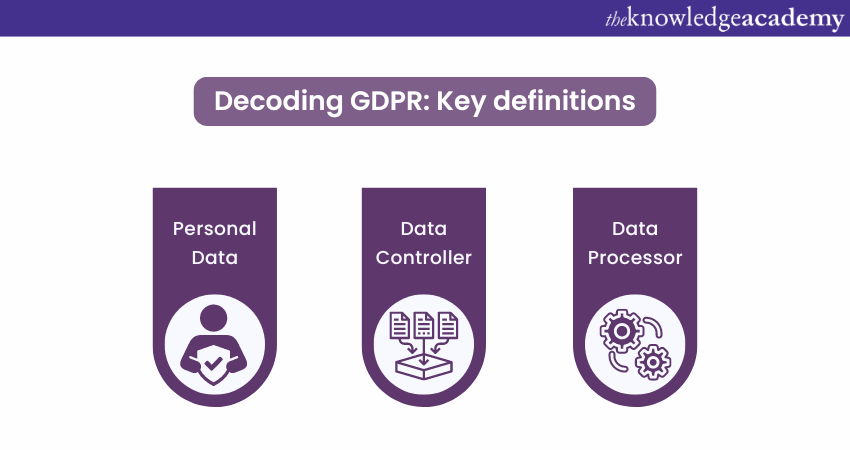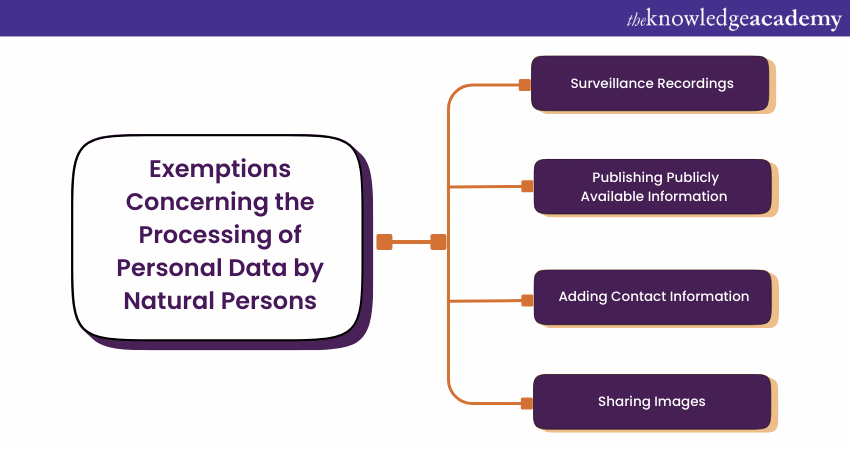We may not have the course you’re looking for. If you enquire or give us a call on +33 805638382 and speak to our training experts, we may still be able to help with your training requirements.
Training Outcomes Within Your Budget!
We ensure quality, budget-alignment, and timely delivery by our expert instructors.

Imagine a digital world where your personal data is protected with the highest integrity. This is the vision behind the General Data Protection Regulation (GDPR), which has transformed our digital landscape. Understanding GDPR isn’t just about compliance—it’s about building stronger relationships and safeguarding rights in this digital age. This blog will guide you through GDPR Scope, revealing its implications and empowering you to protect your digital privacy.
Table of Contents
1) What is GDPR?
2) Key Terminologies to Understand GDPR
3) What is the Scope of GDPR?
4) Personal Data Processing
5) Exemptions Concerning Processing of Personal Data
6) Exemptions in the Case of Freedom of Information and Expression
7) Conclusion
What is GDPR?
The GDPR is an EU law designed to safeguard the personal data of individuals residing within the EU. Therefore, it’s important for organisations to adhere to their rules and obligations, making regular GDPR Audits crucial for ensuring transparency, consent, and individual rights.
Moreover, GDPR compliance strengthens data privacy practices and fosters accountability. As a result, it empowers individuals with greater control over their personal information and enhances trust in the digital landscape.
Further, we will discuss the two key aspects of GDPR:
History of GDPR
The EU approved the GDPR on April 14, 2016, and it came into force on May 25, 2018. However, its development began long before. At that time, GDPR replaced the outdated Data Protection Directive of 1995. It was designed to address the Challenges of GDPR posed by rapid technological advancements and the increasing digitalisation of personal data.
This means that businesses worldwide may be subject to GDPR requirements if they offer goods or services to EU residents or monitor their behaviour. The geographical scope of GDPR ensures that the protection of personal data extends beyond EU borders, promoting a consistent level of privacy rights and safeguarding individuals regardless of their location.
Geographical Applicability of GDPR
Geographical applicability is a crucial aspect of the GDPR. The regulation has a broad reach and applies to organisations located within and outside the EU, possessing the personal data of EU citizens.
This means that businesses worldwide are subjected to comply with GDPR Requirements if they offer goods or services to EU residents or monitor their behaviour. The geographical Scope of GDPR ensures that the protection of personal data extends beyond EU borders, promoting a consistent level of privacy rights and safeguarding individuals regardless of their location.
Key Terminologies to Understand GDPR
To navigate GDPR Compliance successfully, understanding the core terminologies is essential. Here are the key terms you need to know to gain a comprehensive grasp of the topic:

1) Personal Data: Personal data refers to any information that relates to an identified or identifiable individual. It includes various types of data, such as names, addresses, email addresses, and IP addresses, Personal data is protected under GDPR, and organisations must handle it in a responsible manner.
2) Data Controller: A data controller determines the purposes and means of processing personal data. They comply with GDPR and ensure that personal data is processed transparently, lawfully, and securely.
3) Data Processor: A Data Processor is a person who processes personal data on behalf of the Data Controller. Their primary responsibility is to process personal data according to the Data Controller's instructions. They are contractually obligated to protect the data and ensure its security. Moreover, they have specific GDPR responsibilities, such as safeguarding personal data and implementing appropriate technical and organisational measures.
Protect your data and ensure compliance—join our GDPR Awareness Training today!
What is the Scope of GDPR?
Personal data includes sensitive information, such as name, address, and phone number. Hence, it should be treated with caution, as any leakage of this sensitive information could result in devastating consequences. That’s where GDPR comes in. However, in some cases, it’s also applicable for manual data processing.
The GPDR is applicable within the EU zone, but there are some exceptions where it can be applicable outside of it as well. Let’s say your organisation is outside the EU zone but collects the personal data of EU citizens. Then, your organisation should adhere to the GDPR guidelines. So, it doesn’t matter what processes are involved and who carries out the activities of collecting personal data, the GPDR is still applicable.
From small businesses and large corporations to private individuals, the GDPR and Data Protection Act apply to all of them. However, exceptions are applicable in some cases, for instance, if the process of collecting this information is exercise such as sent under their rights, freedom of information and expression acts.
Personal Data Processing
Any information that can be used to identify a person is personal information. They can be used to identify a person on their own, or they can be used in combination with others. Now, typical information like name, phone number, address, etc., is personal information. However, they are not the only things that come under personal data. Other information, like images, voice recordings, videos etc., can also come under personal information, apart from your digital data such as your IP addresses and your browsing history.
So, if this information is stored, read and analysed thoroughly. In such a case, the GDPR is applicable. Moreover, the GDPR is also applicable even if these data are processed manually.
Let’s say the data you are processing is outside the EU. However, the Data Controller has facilities operating inside the EU, performing certain operations related to processing personal data, and it has to adhere to GDPR guidelines.
Besides, if your organisation is involved in the process of processing data along with monitoring it, it should also adhere to the General Data Protection Regulation.
Elevate your data protection expertise with our Certified EU GDPR Practitioner Course - sign up now!
Exemptions Concerning the Processing of Personal Data by Natural Persons
In some cases, the GDPR is not applicable if the data processing is done by natural persons of interest as a private activity. Here, natural persons refer to human beings or data subjects whose personal data is being processed. GDPR aims to protect their personal data. However, there is an exception to it. Let’s look at some examples of when these exemptions are applicable:

a) Surveillance Recordings: The GDPR exemptions come into play when individuals use cameras or video recording devices to monitor and secure their personal property. For instance, if you install a security camera at your home to monitor your property for safety reasons, this is generally considered a private activity. The GDPR recognises that such personal security measures shouldn't be subject to the full scope of the regulation.
b) Publishing Publicly Available Information: GDPR exemptions are also relevant when individuals publish information that is already publicly accessible, such as names, addresses, and other contact details that can be easily found in public directories or listings. Since this data is already in the public domain, the GDPR does not impose additional requirements on its processing by natural persons.
c) Maintaining Contact Information: When an individual keeps an address book or contact list for personal use, storing names, phone numbers, and email addresses of friends and acquaintances, GDPR exemptions come into play. This activity is considered private and non-commercial and does not require adherence to the GDPR's stringent rules.
d) Sharing Images: GDPR exemptions also cover situations where individuals take photos or images for private use and share them on social media platforms with a limited audience, typically a few individuals. In such cases, the data processing is considered a personal, non-commercial activity, and the GDPR's stringent requirements do not apply.
Exemptions in The Case of Freedom of Information and Expression
The GDPR is a legal framework created to protect individuals' privacy and personal data. However, it also recognises the importance of balancing these rights with other fundamental values, such as freedom of information and freedom of expression.
To strike this balance, the GDPR includes exemptions and provisions that apply in specific situations to safeguard these important rights. Here's an overview of the exemptions of GDPR in the context of freedom of information and expression:
Journalistic and Academic Purposes
GDPR has a specific provision called Article 85. It provides exemptions specifically designed to protect freedom of expression and freedom of the press. It states that EU member states may adopt specific rules to reach a middle ground. It means they can merge the protection of personal data rights with the right to freedom of expression, including processing for journalistic, academic, artistic, or literary purposes.
These rules can allow for derogations from certain GDPR provisions, but they must be proportionate and respect the essence of both rights.
This exemption allows journalists, researchers, artists, and authors to continue their work without any restrictions while respecting the privacy of others. It emphasises the importance of responsible journalism and creative expression.
Public Interest
Under Article 6 of the GDPR, the processing of personal data is lawful when it is necessary for the performance of a task carried out in the public interest. This exemption allows public authorities to process personal data when it serves a legitimate public interest, such as public health, national security, or law enforcement.
Similarly, Article 9 permits the processing of special categories of personal data (sensitive data) for reasons of substantial public interest, such as for health and social care, without the need for explicit consent.
These provisions ensure that government agencies and public bodies can carry out their essential functions while complying with GDPR Principles.
Freedom of Information Legislation
GDPR acknowledges that the regulation should not hinder the right to access public documents based on freedom of information laws at the EU or member state level. This recognition aligns with the principles of transparency and access to government information.
Freedom of Information Laws may provide mechanisms to request access to public documents that may contain personal data. The GDPR respects these laws and allows for the disclosure of such documents when it is in the public interest.
Overall, the GDPR recognises the importance of balancing privacy rights with freedom of information and freedom of expression. It includes provisions and exemptions that enable these fundamental rights. These provisions ensure that privacy is protected without unduly hindering essential freedoms.
Conclusion
Understanding GDPR Scope is crucial to safeguard personal data and upholding individuals' privacy rights. Organisations must understand its scope and requirements to ensure compliance, enhance data protection practices, and build customer trust. Moreover, staying updated with GDPR is essential in today's data-driven world to maintain privacy and meet legal obligations.
Master data protection compliance with our Certified EU General Data Protection Regulation (EU GDPR) Foundation Course and safeguard your business's future.
Frequently Asked Questions

GDPR covers personal data that can directly or indirectly identify an individual. This includes names, addresses, identification numbers, IP addresses, location data, and online identifiers. It also encompasses information related to physical, physiological, genetic, mental, economic, cultural, or social identity.

GDPR applies if an organisation processes the personal data of individuals in the EU or UK, offers goods or services to them, or monitors their behaviour within the EU or UK, regardless of the organisation’s location. It applies to both controllers and processors of such data.

The Knowledge Academy takes global learning to new heights, offering over 30,000 online courses across 490+ locations in 220 countries. This expansive reach ensures accessibility and convenience for learners worldwide.
Alongside our diverse Online Course Catalogue, encompassing 19 major categories, we go the extra mile by providing a plethora of free educational Online Resources like News updates, Blogs, videos, webinars, and interview questions. Tailoring learning experiences further, professionals can maximise value with customisable Course Bundles of TKA.

The Knowledge Academy’s Knowledge Pass, a prepaid voucher, adds another layer of flexibility, allowing course bookings over a 12-month period. Join us on a journey where education knows no bounds.

The Knowledge Academy offers various GDPR Trainings, including the GDPR Awareness Training and Data Protection Act Training (DPA 2018). These courses cater to different skill levels, providing comprehensive insights into the Benefits of GDPR for Businesses.
Our IT Security & Data Protection Blogs cover a range of topics related to GDPR compliance and implementation, offering valuable resources, best practices, and industry insights. Whether you are a beginner or looking to advance your data protection skills, The Knowledge Academy's diverse courses and informative blogs have got you covered.
Upcoming IT Security & Data Protection Resources Batches & Dates
Date
 Certified Data Protection Officer (CDPO)
Certified Data Protection Officer (CDPO)
Fri 10th Jan 2025
Fri 14th Mar 2025
Fri 9th May 2025
Fri 11th Jul 2025
Fri 12th Sep 2025
Fri 14th Nov 2025







 Top Rated Course
Top Rated Course



 If you wish to make any changes to your course, please
If you wish to make any changes to your course, please


